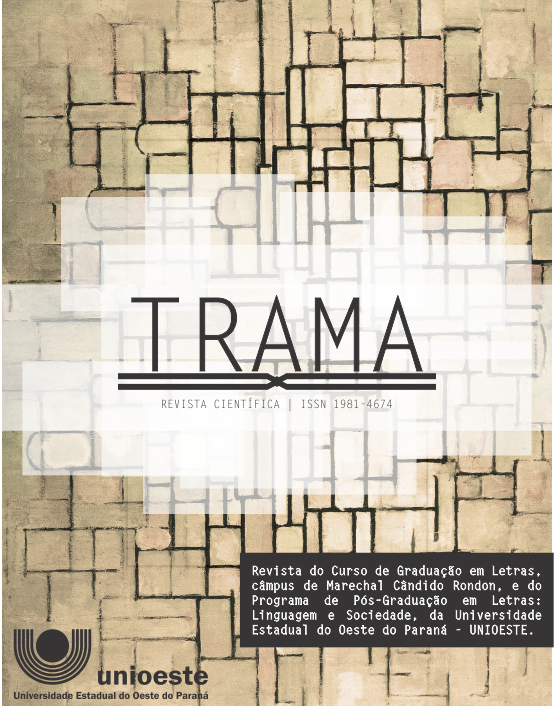EVIDENCE OF ELEMENTS OF POST-COLONIAL LITERATURE IN PROSE PRODUCTIONS OF THE DEAF PEOPLE IN BRAZIL
HISTORY, TRADITION AND CULTURE
DOI:
https://doi.org/10.48075/rt.v17i42.24725Keywords:
Visua/spatial tradition, Deaf literature, History of deaf prose, Postcolonial productionsAbstract
This article aims to present the evidence of post-colonial literature in the prose productions of the deaf people, specifically in culturally adapted tales. In order to understand the importance of these productions for the deaf people, we treat the oral tradition in the literary field that in deaf literature is applied as a visual/spatial or signalized tradition. Then, we l present the brief historical trajectory of deaf literature over time and, afterwards, we analyze culturally adapted tales in deaf literature, presenting the post-colonial evidences in the works. To support this work we will use authors of deaf studies, namely: Lodenir Becker Karnopp, Cláudio Henrique Nunes Mourão and Marta Morgado. For the post-colonial approach, we resort to: Edward Said, Homi K. Bhabha and Thomas Bonnici. With regard to the concept of tradition in the literature, we use studies of Maurice Halbwacs and Ruth Finnegan. The results confirm deaf literature as a space for the construction and reconstruction of meanings, as well as a way of maintaining the culture of the deaf people. Oral tradition, in the context of the literature of the deaf people, can be understood as visual/spatial or signalized tradition, with it and, through it, the cultural tradition and the sign language have remained alive, preserving and strengthening throughout history, the way of being and thinking of the deaf.
References
ASHCROFT, Bill. GRIFFITHS, Gareth. TIFFIN, Helen. The empire writes back – theory and pratice in post-colonial literatures. London: Routhedge, 1991.
BONNICI, Thomas. Teoria e críticas pós-colonialistas. In: BONNICI, Thomas; ZOLIN, Lúcia Osana (org). Teoria literária: abordagens históricas e tendências contemporâneas. Maringá: EDUEM, 2019.
GEERTZ, Clifford. A interpretação das culturas. Rio de Janeiro: LTC, 2017.
HALBWACHS, Maurice. A memória coletiva. São Paulo: Editora Revista dos Tribunais, 1990.
HESSEL, Carolina; KARNOPP, Lodenir; ROSA, Fabiano. Rapunzel Surda. Canoas: ULBRA, 2003.
HESSEL, Carolina; KARNOPP, Lodenir; ROSA, Fabiano. Cinderela Surda. Canoas: ULBRAS, 2003.
FINNEGAN, Ruth. O significado da literatura em culturas orais. In: QUEIROZ, Sônia (org). A tradição oral. Belo Horizonte: Viva voz - FALE/UFMG, 2016, p. 61-98.
KARNOPP, Lodernir. ROSA, Fabiano. Patinho Surdo. Canoas: ULBRA, 2005.
KARNOPP, Lodenir. Adão e Eva. Canoas: ULBRA, 2005.
KARNOPP, Lodenir. Literatura Surda. Revista educação temática digital, Campinas, v.7, n.2, p. 98-109, jun. 2006, p. 98-109. Disponível em: https://www.ssoar.info/ssoar/bitstream/handle/document/10162/ssoar-etd-2006-2-karnopp-literatura_surda.pdf?sequence=1. Acesso em: 27/04/2020.
LADD, Paddy. Em busca da surdidade I - colonização dos surdos. Trad. Mariani Martini. Lisboa: Surd’Universo, 2013.
MONTEIRO, Tatyana. Negrinho e Solimões. Manaus: BK editora, 2014.
MORGADO, Marta. Literatura de línguas gestuais. Lisboa: Universidade Católica editora, 2011.
NGUGI, Wa Thiong. Decolonizing the mind: the politics of language. London: James Curriey, 1986.
OLIVEIRA, Carmem Elizabete; BOLDO, Jaqueline. A cigarra surda e as formigas. Porto Alegre – RS: Corag - Imprensa Oficial do Estado do Rio Grande do Sul, 2004.
SAID, Edward. Orientalismo o oriente como invenção do ocidente. São Paulo: Companhia de Bolso, 2007.
SPENCE, Raquel Sutton; KANEKO, Michiko. Introducing Sign Language Literature folklore and creativity. London: Palgrave, 2016.
SPENCE, Raquel Sutton; Dorothy Miles. European cultural heritage online (ECHO). Dez. 2003.
Disponível em: http://sign-lang.ruhosting.nl/echo/docs/Dorothy%20Miles.pdf . Acesso em: 27/04/2020.
SPIVAK, Gayatri Chakravorty. Pode o subalterno falar?. Belo Horizonte: UFMG, 2014.
Recebido em 29-04-2020
Revisões requeridas em 22-06-2020
Aceito em 06-07-2020
Downloads
Published
How to Cite
Issue
Section
License
Copyright (c) 2022 Trama

This work is licensed under a Creative Commons Attribution-NonCommercial-ShareAlike 4.0 International License.
Aviso de Direito Autoral Creative Commons
Política para Periódicos de Acesso Livre
Autores que publicam nesta revista concordam com os seguintes termos:
1. Autores mantém os direitos autorais e concedem à revista o direito de primeira publicação, com o trabalho simultaneamente licenciado sob a Licença Creative Commons Attribution que permite o compartilhamento do trabalho com reconhecimento da autoria e publicação inicial nesta revista.2. Autores têm autorização para assumir contratos adicionais separadamente, para distribuição não-exclusiva da versão do trabalho publicada nesta revista (ex.: publicar em repositório institucional ou como capítulo de livro), com reconhecimento de autoria e publicação inicial nesta revista.
3. Autores têm permissão e são estimulados a publicar e distribuir seu trabalho online (ex.: em repositórios institucionais ou na sua página pessoal) a qualquer ponto antes ou durante o processo editorial, já que isso pode gerar alterações produtivas, bem como aumentar o impacto e a citação do trabalho publicado (Veja O Efeito do Acesso Livre).
Licença Creative Commons
Esta obra está licenciada com uma Licença Creative Commons Atribuição-NãoComercial-CompartilhaIgual 4.0 Internacional, o que permite compartilhar, copiar, distribuir, exibir, reproduzir, a totalidade ou partes desde que não tenha objetivo comercial e sejam citados os autores e a fonte.


